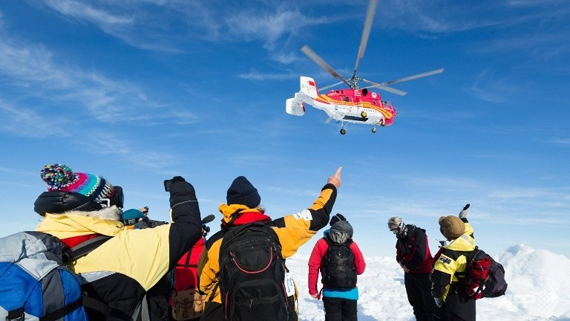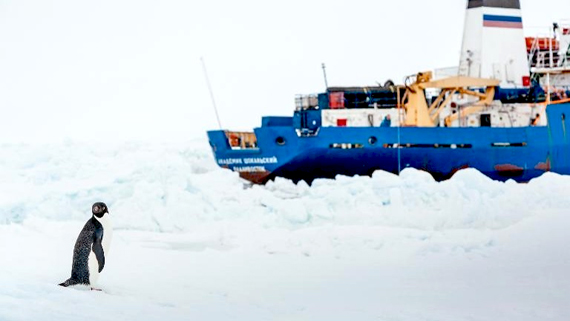
Sydney, Jan 2: All 52 passengers were airlifted on Thursday from a Russian research vessel icebound in Antarctica and are safe on board an Australian supply ship, rescuers said.
"Aurora Australis has advised AMSA that the 52 passengers from the Akademik Shokalskiy are now on board," the Australian Maritime Safety Authority said.
Passengers were flown to the Australian ship in groups of 12 by a helicopter from a Chinese icebreaker.
The Akademik Shokalsky has been stuck in ice since December 24 100 nautical miles east of the French base Dumont d'Urville, with several icebreaking attempts failing to reach it.
After a number of false starts a helicopter evacuation of the research vessel's passengers began on Thursday evening, with official confirmation that it was underway reaching AMSA at 6.15pm Australian time (0715 GMT).
The Australian agency, which is coordinating the rescue mission, reported all passengers were safey on board the Aurora Australis - an Australian government supply ship - at 10.15pm, some four hours later.
Passengers were airlifted from a makeshift landing pad on the ice beside the Russian ship to an ice floe near the Australis.
Expedition leader Chris Turney expressed relief that the wait was finally over.
"We've made it to the Aurora Australis safe and sound. A huge thanks to the Chinese and the (government's) Australian Antarctic Division for all their hard work," Turney tweeted.
Earlier:
Antarctic helicopter rescue of trapped ship passengers delayed due to sea ice

Moscow, Jan 2: A planned helicopter rescue of 52 passengers on a Russian ship stranded in Antarctic ice since Christmas Eve was delayed on Thursday due to unfavourable sea ice conditions in the area.
The helicopter on the Chinese icebreaker Snow Dragon had planned to lift passengers from the trapped Akademik Shokalskiy on Thursday and then use a barge to transport them to the nearby Aurora Australis, Australia's Antarctic supply ship. "Current sea ice conditions prevent the barge from Aurora Australis from reaching the Chinese vessel Xue Long (Snow Dragon) and a rescue may not be possible today," the Australian Maritime Safety Authority (AMSA), which is coordinating the rescue, said in a statement. It was not safe for the helicopter to land either on the Aurora Australis or next to the vessel, the agency added. "It is now likely the rescue will not go ahead today. The preferred option is to wait for conditions that will allow the rescue to be completed in a single operation to reduce unnecessary risk," AMSA said.
The Russian ship left New Zealand on November 28 on a private expedition to commemorate the 100th anniversary of an Antarctic journey led by famed Australian explorer Douglas Mawson. It became trapped on December 24, 100 nautical miles east of French Antarctic station Dumont D'Urville and about 1,500 nautical miles south of Australia's southern island state of Tasmania. The Chinese ship got within sight of the Akademik Shokalskiy on Saturday, but turned back after failing to break the ice, which was more than 3 metres (10 feet) deep in places. Two other vessels, Australia's Aurora Australis and a French flagged ship, also tried to help but failed to reach the ship due to high wind and heavy snow.





Comments
Add new comment